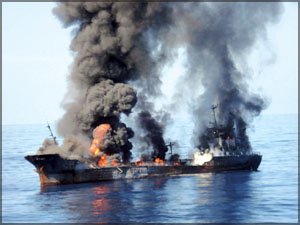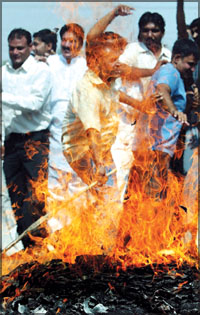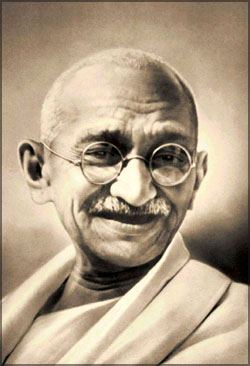|
Indian Diary
Military aid to Sri Lanka
According to a report in the Indian press, Indian Cabinet panel has
refused military aid to Sri Lanka.

It is difficult to say whether Sri Lankan Govt. failed to lobby the
case in its right perspective or Indian Govt.'s appreciation of problem
and response has been inadequate, under pressure from the regional Tamil
outfits.
India's stand that Colombo should look for a peaceful solution and
work for the devolution of powers to the Tamils, gives the impression
that New Delhi doesn't want to stir hornet's nest and will not do
anything which disturbs its delicate and fragile balance of support at
the center. My views which I have sent to the media in India also are as
under:
(1) Sri Lanka is our neighbour as are Pakistan and Bangladesh. Rather
in Sri Lanka we have a neighbour who has never been a source of trouble
for us. It is also true that our foreign Policy issues in respect of
Pakistan and Bangladesh are not allowed to be influenced by the feelings
and dictates of the regional outfits of the States bordering Pakistan
and Bangladesh.
Therefore, in all fairness, foreign policy matter involving Sri Lanka
should also be independent of the feelings of the regional Tamil
Outfits. Agreed, Sri Lanka has substantial population of Tamils but that
holds true for Bangladesh also where there is a considerable population
of Bengalis.
(2) LTTE's ability to make aerial attacks cannot be ignored by India.
A terrorist outfit acquiring capability to make aerial attacks at a
striking distance from the Indian border needs to be viewed seriously
not only by Colombo but by India also, in the interest of peace and
stability in South Asia.
(3) It is also a fact that LTTE enjoys the dubious reputation of
being the world's most deadly guerrilla force. Such outfits have no
principles, loyalties or a sense of belonging.
If they could kill Rajiv Gandhi, they can also join hands with
terrorist outfits already in operation in India and with Naxals who are
spreading their wings in India at a menacing rate. Therefore, LTTE is a
threat not only to Colombo but to India also.
(4) Agreed, Sri Lanka should not be given arms supply if its
objective is to militarize itself, but arm supply to demolish the newly
acquired air facility by a terrorist group like LTTE which is a danger
also to India should be considered especially when the last two attacks
have exposed Sri Lanka's vulnerability.
(5) There is no denying that devolution of powers to Tamils in Sri
Lanka is an essential requisite for good governance and peace in the
Island but that aspect has to be appreciated and handled by Colombo
establishment and I believe they are already working on that. But, India
cannot put itself in an advisory role and that cannot be the condition
to help the neighbour in need.
If we look at the other side, India has miserably failed in getting
the basic rights to Hindu minorities in Pakistan and Bangladesh. Again
it is not a right approach to mix LTTE issue with empowerment of Tamils
in Sri Lanka. Even if India is worried about Tamils in Sri Lanka, the
issue has to be taken up on a separate forum.
Dayanidhi Maran's resignation presents an unedifying and ludicrous
spectacle of Indian Politics.
Coalition culture of which our political class feels proud of.
Salient features
The other major story of the week that grabbed headlines in the press
was India's Ex Communication and IT Minister Dayanidhi Maran's sudden
and swift exit from the Union cabinet in deference to the wishes of his
grand uncle and DMK patriarch Karunanidhi.
This episode presents a very ludicrous picture of Indian political
system.
The issues surfaces are, 1. PM is reduced to a rubber stamp. 2. Now
there is a quota in the Ministry also. 3. Where is the freedom of
expression? 4. Our family centric democracy.
According to the country's constitution, it is the prerogative of the
Prime Minister (PM) to select members for his Cabinet team, who are then
appointed by the President. But, in this case, a high performer like
Dayanidhi is ordered to be removed by somebody who is not supposed to
have any say in Ministry formation, against the wishes of the PM.
In a way prerogative of the PM is snatched in a blatant manner by a
person who should have no say in the Cabinet formation. In the process
PM is reduced to a rubber stamp as at one time we used to say about our
President.
There is a quota in govt. jobs, and then there is a quota in
educational institutions, now there is a quota in the Ministry. In the
name of coalition dharma, coalition partner can send any person
irrespective of whether he is approved by the PM and again can press for
a ministry of its choice. In a way, the president of the political
outfit will rule at the centre through his hand picked man. Thus it is
not wrong to say that there exists a quota system which sans merit, in
the Union Cabinet also.
Karunanidhi's disapproval to the publishing of opinion poll by
Dinakaran, a Tamil newspaper clearly sends a message that freedom of
expression is there till it suits the big boss. Why condemn our Ex-PM
Indira Gandhi for forcing emergency in 1975, when the present breed can
stoop still lower.
So family centric has become our democratic system that now
Karunanidhi is thinking of sending his daughter Kanimozhi to Rajya Sabha
as his new face in Delhi. In a nutshell son should control the State and
the daughter should control at the center taking advantage of the
present system. Sometime back MDMK's Vaiko, once close to Karunanidhi
too had to resign because he was seen overshadowing his son Stalin.
Here it is worth mentioning that Dayanidhi played a spectacular
innings as a Minister which gets reflected by the mind-boggling figures
in respect of growth in his tenure.
It was he who raised foreign direct investment in telecom to 74
percent and consequently between February 2005 to April 2007, the 26
months he was a Minister for Communication, India received foreign
investment worth Rs. 266,000 crores out of which Rs. 47,000 crore, went
to Tamil Nadu.
The number of software and hardware firms that have set up shops in
Chennai and around in the last three years bear testimony to the grand
job he did for his State and people.
Thus he served his country, served his State and while doing so if
his family empire also grew by leaps and bounds, there is nothing
unusual in the present era of Indian Politics. (His elder brother runs a
business whose fortunes are affected by the decisions his ministry was
taking) It is being said that his business success had made Karuna's
sons jealous.
Common man in Sri Lanka can breathe easy
While travelling from Colombo to Kandy by an A.C Bus I was pleasantly
shocked when the conductor asked me to pay Rs. 180 only ( Sri Lankan
currency). In India I would have paid Sri Lankan Rs. 500 for the same
journey. to pay Rs. 180 only ( Sri Lankan
currency). In India I would have paid Sri Lankan Rs. 500 for the same
journey.
I was told by a fellow passenger that if I had opted for an ordinary
bus the fare would have been just Rs. 80. In India the average bus fares
are 2.5 times of what the Sri Lankans pay.
Train travel which I don't think many people undertake in Sri Lanka,
is also very cheap. For food items Sri Lankans pay less than what an
average Indian is paying at present. Good Apparels are available at half
the cost at what we pay in India.
If the report given to me that education up to the degree level which
includes professional courses also, is free, then I must say that the
life of a common man in Sri Lanka is far more comfortable than his
counterpart in India.
Far less beggars, fewer slums, comparatively low pollution level,
less traffic jams contribute to better ambience and give a better image
at least to an Indian. There looks to be good stress on Human
development in the context of the common man. But, all services which
are in the hands of private agencies like Taxis, three wheelers, and
laundry, etc, are costlier than in India but then a common man hardly
uses these.
To me, freedom of expression, devolution of power upto the lowest
rung, democratic system which gives equal rights to all citizens, are
the things which any nation should strive to achieve and feel proud of
but all these have a little meaning if majority population remains
deprived of basic needs of life- food, education, drinking water and
roof on the head.
Again any growth which leads to inequality is inimical to the peace
of the country and can invite problems in the long run. Sri Lankan's
record on human development index and equality index is worthy of
appreciation and emulation by its neighbour India.
In my opinion, Sri Lankan Govt. despite having been hamstrung by LTTE
problem is a Welfare State in its true sense.
From Free Market Driven Economy to a controlled Economy
India prided itself when after ten years of reforms it projected
itself as a free market driven economy to the world business community
and it paid rich dividends in the sense that all foreign companies
looked keen to do business with India and many opened their shops here.
At the same time, Indian companies also made a growing presence in
foreign countries. Indian companies in the last few years have bought a
few giant foreign companies in Steel, Aluminum, automobiles, auto
components, hospitality business and Whiskies apart from creating
production facilities at a number of places around the globe.
But, the present UPA Govt. wilted under the high inflation of 6%
which in the last two years witnessed prices of eatables and food grains
going through the roof. Under the situation, UPA's anxiety to control
inflation is understandable, but after getting panicky consequent to
electoral reverses, the measures it has initiated are not going to
impact vast majority of common men who have very little to do with
Cement and Steel, two commodities which have come under the price
regulation.
It points to Government's flawed perception of poor and poverty. On
the other hand, price control on cement and steel is sending wrong
signals to the business community across the globe. General opinion is
that economic reforms have stuck and government is moving in a backward
direction. It is no wonder that affluent US investors prefer China to
India.
At the same time appreciating rupee against US$ and other currencies
has made the life of exporters very tough. (appreciation is around 10%
in the last six months) Small exporters especially who deal in Garments
are badly hurt and have started complaining loudly about the
appreciating rupee.
Caste System in India
Today when the fate of electoral battles in India depends on how best
a political party has done the caste arithmetic, it is worth knowing
about the caste system in India. There is no mention of anything like
the caste system in Vedas which are considered to be the original source
of what is now called the Hindu Religion. arithmetic, it is worth knowing
about the caste system in India. There is no mention of anything like
the caste system in Vedas which are considered to be the original source
of what is now called the Hindu Religion.
The Vedic period dates back to around 5000 B.C. It is said that the
caste system was introduced at around 2000 B.C. for the sake of social
order and social welfare by sage Manu. The laws and bylaws of caste
system and rules for the ideal living, good governance and ideal conduct
are contained in his book Manu Smrutis.
Under the system, each individual had a role to play according to his
mental and physical endowments to ensure provision of services and goods
to the masses. Thus the system of division of society into castes as
enunciated by Sage Manu was not hereditary as is generally believed.
Sage Manu divided the society into four classes -Brahmin -who should
be well read, altruistic and capable of imparting religious teachings to
other classes and should be able to distinct himself with his knowledge.
Kashtriya -who is in the warfare and is judged by his prowess,
Vaishya -who is in the business and is judged by the material wealth in
his possession. Shudra- He who fails to acquire education and at the
same time does not possess the attributes to be amongst Kashtriya and
Vaishya.
He was expected to be in the service of the other three classes or do
such jobs which were of manual nature involving bodily skills.
Such division of society remained in practice till the time of
Mahabharata but after that, as the decline of values started, the vested
interests amongst Brahmins in order to see that their dominance becomes
a family business and it runs from one generation to another, made this
system hereditary, i.e., by birth, by presenting a wrong interpretation
of Manu Samriti.
Such vested interests started bringing out the revised texts of the
holy books with interpolations which might suit their designs.
With the result, the caste system became increasingly obnoxious by
the fact that four original castes steadily mushroomed into 4000 main
castes and countless sub-castes. This division of society led to inter
and intra caste wars between 'haves' and 'have nots'.
How badly this caste system has divided the Indian society gets
reflected by these facts - in ninety five percent of the marriages in
Hindus, caste is a main factor. Inter -caste marriages are frowned upon
and in some cases boy and girl have to face extrication from their
respective communities.
There are number of such community services like Wells for drinking
water in the villages which cater to the needs of a particular community
only and if a person of lower community uses that, he is at the risk of
being taken to task. There are temples in villages which have two doors
one for the high castes known as twice born and other for lower class
known as the children of lesser God.
Even still worse is the existence of untouchability among different
sub- castes in Dalits. For example, a son of a cobbler considers himself
to be higher than the son of a scavenger and refuses to share his food
with him.
These children of lesser God are untouchable not only when they are
alive but even after their death also. In Kerala, there are separate
cemeteries for the untouchables. The caste based reservations in the
educational institutions have further aggravated the situation. At
student level itself, young boys and girls start experiencing the
discrimination because of the caste they had acquired by birth.
In the nineteenth century which is considered to be the period of
renaissance in Indian context, various reformers raised voice against
this wrong practice and advocated the spread of education to eradicate
this social evil. It had its salutary effects and people started rising
above caste considerations. At that point, it was being felt that with
the spread of education, caste system would meet its natural death.
Even those who have converted from Hinduism are motivated to practice
caste system for the votes and what is paradoxical that though
Christianity, Islam and Buddhism do not sanction caste system but when
the followers of these religions clamour for caste based reservations,
their religious leaders also choose to remain silent for the fear of
losing numbers. With the result today untouchability exists in India
amongst Christians, Muslims and Buddhists also.
Under the situation caste system looks to stay even when our country
attains cent percent literacy.
Sacred space
'The best way to find yourself is to lose yourself in the service of
others.' 'Justice that love gives is surrender, justice that law gives
is a punishment' 'Must I do all the evil I can before I learn to shun
it? Is it not enough to know the evil to shun it? If not we should be
sincere enough to admit that we love evil too well to give it up.' justice that law gives
is a punishment' 'Must I do all the evil I can before I learn to shun
it? Is it not enough to know the evil to shun it? If not we should be
sincere enough to admit that we love evil too well to give it up.'
Mahatma Gandhi
'He who has conquered himself by the self is the friend of himself,
but he whose self is unconquered, his self acts as his own enemy like an
external foe.'
'A stable mind is one which remains unperturbed amid joys and
sorrows, is free from passion, fear and anger and is unattached to
worldly pleasures.' Bhagavad-Gita- This holy book contains the sermons
of Hindu Lord Shri Krishna. |

